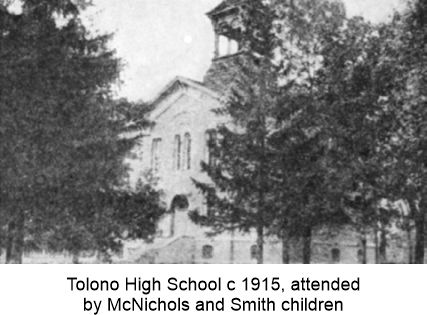|
Daisy and Ernest had
grown up in the village of Tolono, IL. Daisy Smith McNichols (1873–1961) was the daughter of Henry Christian Smith
(1837–1913) and Martha Penniston (1841–1914) with six siblings, and Ernest S. McNichols (1872–1956) was the oldest son of Arthur W. McNichols (1849–1906) and Sarah Jane Littler
(1848–1925) with five siblings.
Daisy's father, a carpenter, had been an early settler in Tolono, building some of
the village's first houses. He later operated businesses in lumber, candy, groceries and fruit
orchards, at death leaving behind a $20,000 estate (inflation adj. $631k). Ernest's father was
a civil war veteran and longtime druggist in
Tolono, IL.
Around eight hundred people lived in Tolono in 1903. Trips to
the much larger city of Champaign, about ten miles away, were common.

In the years after the fire
Ernest and Daisy finally settled in Weldon in the center of a triangle
formed by Bloomington, Decatur and Champaign, Illinois, a long way from Chicago and with a
population of five hundred, similar to what they'd grown up with. They had
one child, Arthur William McNichols (1915–2007), named
after Ernest's father and one of Daisy's brothers.▼1
In 1910 Ernest worked as an enumerator for the U.S. Census. The work started on April 15. According to Wikipedia, he counted 726 residents of Lake
Bluff. In Lake Bluff in 1914 Ernest's drugstore was a Rexall store.
Daisy sang in church choirs and was active in the Womens Club and Eastern Star of Dewitt. Ernest played cello in the Summer Orchestra and was active in the
Community Sing as well the Weldon Commercial Club, Knights of Pythias and maintained a steady
advertising budget for the drug store for many years. In 1918 he became an official recruiting
agent for the Merchant Marines.
|
 |
In January 1919 Ernest and A. H. Montgomery wrote to congressman William Brown McKinley▼2 to request a captured
German cannon for Weldon to display in its WWI memorial in the city park on Water St. McKinley
introduced a bill to the house "That the Secretary of War be, and he is hereby authorized and
directed to donate to the city of Weldon, Illinois one cannon or fieldpiece captured by the
American Army from the forces of the Imperial German Government during the present war."
There is a cannon in a park in Weldon but I failed to learn anything about
when it arrived. There is a fellow named Bob in Weldon who might know and I'm waiting
to hear from him.
1953 Fiftieth anniversary of Iroquois Theater fire
On December 27, 1953 as the fiftieth anniversary of the Iroquois
Theater fire approached, The Pantograph newspaper of Bloomington, IL ran a story (that was picked up by at least two
other Illinois newspapers, in Decatur), that is an example of the crabgrass-like habits of
misinformation. The story described the McNichol's experience: "The
show, "Blue Beard," had been in progress only a few minutes when an explosion rocked the house
and the gas lighting fixtures began pouring smoke and flame onto the stage."
There were no explosions involved in the Iroquois Theater fire, nothing poured from light fixtures
and the fire started a few minutes into the second act, not at the beginning of the play.
The 50th Iroquois Theater fire anniversary gathering was held on the second floor
in the Grand Army of the Republic Memorial Hall at the
public library at Randolph and Michigan, as always sponsored by the
Iroquois
Memorial Association. Of the sixty people in attendance was another couple from
central Illinois,
Harry and Zula Randall Hough of Mazon, Illinois, that the McNichols had not met previously.
Though Ernest spent his life as a pharmacist and Harry primarily as a farmer, the men had
common life experiences in addition to surviving the Iroquois Theater fire. Harry was a
pharmacist for a few years before returning to farming, both spent their lives in small Illinois
towns, and both wives sang in their church choirs.
Fire commissioner Michael J. Corrigan ordered an inspection of all 192
theaters and movie houses in Chicago on the 50th anniversary, with participation by all thirty
departments. As a young fireman in 1903 Corrigan had pulled the alarm that summoned all the fire
departments. The 1953 inspection included exits, exit lights, water supplies and pipes, fire
fighting equipment, stage vents and fire curtains, all of which had played a role in 1903. City
ordinance in 1953 required inspections of movie houses twice a year and traditional theaters
monthly, as well as when a new production was launching.
Two women who had been Mr.
Bluebeard performers in 1903,
Annabelle Whitford Buchan and
Chrystal Haerr McGraw, were on hand to recount their experiences.
|
|
Discrepancies and addendum
1. In 1925 Arthur played a trumpet in the school
band in Weldon. After his 1938 graduation from Weslyan University with a Bachelor of Music
he became a school music director.
He eventually settled in Arizona but as had his father, he first tried out several cities,
in northern Michigan, Alabama, and Iowa.
2. William Brown McKinley (September 5, 1856–December 7, 1926) was an American banker and
Republican politician who represented the state of Illinois in the United States House of
Representatives for seven terms (1905–1913, 1915–1921) and in the United States Senate for one
term from 1921 to 1926. McKinley also served as national campaign manager for President
William Howard Taft's re-election bid in 1912, securing Taft's nomination by the
Republican National Convention.
|
